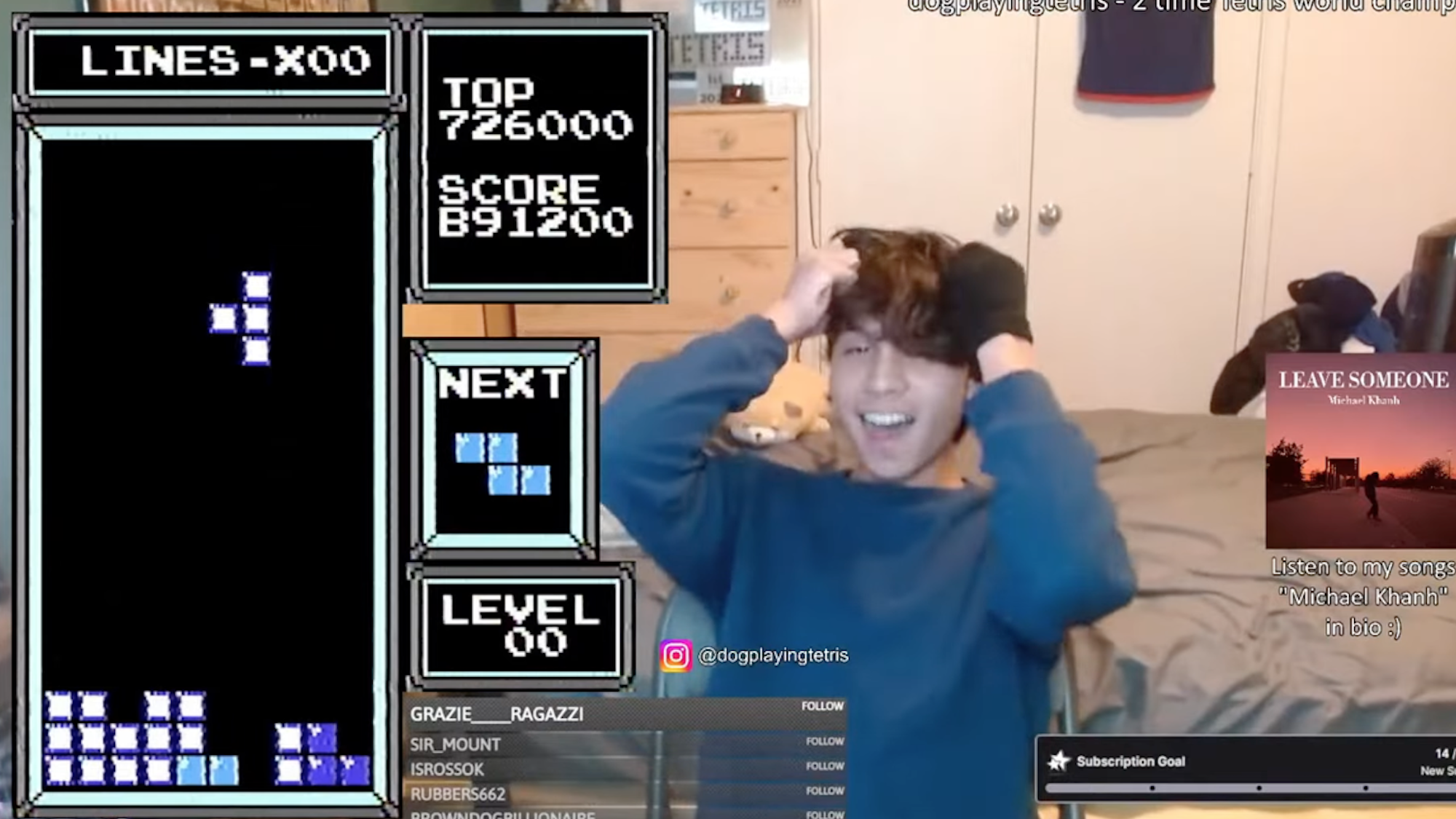A 16-year-old, two-time Tetris world champion made video game history over the weekend by becoming the first player to pull off a “rebirth,” the moment when Level 255 rolls over to reset at Level 0. In doing so, Michael “dogplayingtetris” Artiaga’ proved it’s hypothetically possible to stack 2D blocks for eternity. The teen’s 81-minute feat of endurance during an October 6 Twitch livestream included running through all 255 levels, clearing 3,300 lines, and navigating a mountain of glitches that players have contended with for decades. Apparently not content with simply achieving what many Tetris aficionados once thought impossible, Atrtiaga continued to play through his rebirth run for another 40 minutes before culminating in a record-setting 29.4 million points at 4,216 cleared lines. Artiaga uploaded the full run to YouTube on Sunday, but skipping ahead to the 1:21:24 mark will get you to his moment of triumph.
“Oh my God, bro,” Artiaga shouts numerous times after leaping out of his seat once his Tetris game loops back to Level 0, later adding, “I’ve seen the light… I cannot put into words how draining that is, in every single facet of the game.”
There is a tiny, but necessary, caveat to the newest Tetris milestone. As Ars Technica explained on Monday, an in-game rebirth is technically only possible when players use a modified version of the game that solves for inevitable glitch-induced crashes. But Artiaga’s slightly augmented version of Tetris in no way diminishes his accomplishment. Without this correction, it’s basically impossible to reach Level 255 before the game collapses in on itself like some kind of retro-gaming black hole. One of the best examples is 13-year-old Willis “Blue Scuti” Gibson’s historic Tetris run on December 21, 2023, that saw him become the first person to ever “beat” the game by withstanding its highest speed setting and numerous coding idiosyncrasies until reaching a kill screen at Level 157.
[Related: A 13-year-old wunderkind is the first human to ‘beat’ Tetris.]
For decades following its US debut in 1988, players believed nobody could surpass Level 29. In fact, Soviet software engineer Alexey Pajitnov’s original game technically wasn’t even designed to make it to a Level 30. At that point, the speed at which Tetris blocks fall becomes so fast that it wasn’t physically feasible to reach either side of the well by just pressing the left or right buttons on an NES controller. That all changed in 2010, however, with the introduction of techniques such as “hypertapping,” in which a player vibrates their fingers to circumvent a controller’s restrictions and surpass in-game speeds. In this way, it became theoretically possible to play Tetris forever.
But “theoretically” is the key word there. Even with that hurdle cleared, coding glitches creep into levels that make for increasingly infuriating challenges. At Level 138, for example, a memory overflow error makes Tetris blocks begin to descend in weird color palette schemes that can be hard on the eyes. By Level 155, the game’s score-calculating algorithm introduces an increased chance for in-game crashes every time a player clears a line. Although it’s hypothetically possible to keep going forever at that point, the amount of variable and probability factoring required by a player ostensibly makes crashing inevitable. This is where the coding modification used by professional gamers like Artiaga becomes a necessity.
The tribulations don’t end with the mod correction, either. According to Ars Technica, one final mind numbing headache can be found at Level 235. Once there, yet another coding glitch forces a player to remain in that stage for a daunting 810 lines instead of the standard 10. If that weren’t enough, another backend error causes Level 235’s Tetris blocks to morph into extremely dark green hue that is almost invisible against the game’s black background. It took Artiaga roughly 20 minutes to finally move into Level 236 and clear a path forward to the “final” Level 255 and subsequent rollover back to the beginning—a world-first thanks to “dogplayingtetris.”
“Oh my God, I’m so glad that game is over, bro,” he said after finishing his run. “I never want to play this game again, bro… I was starting to lose my mind.”

